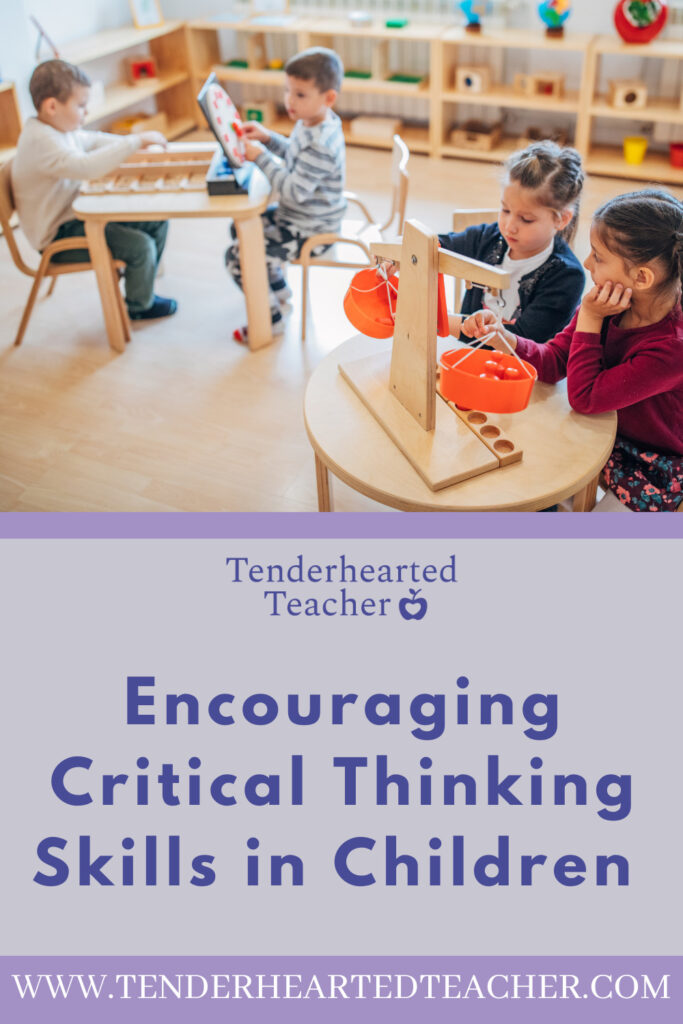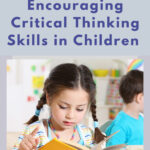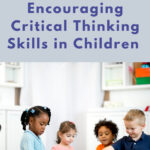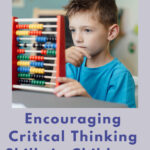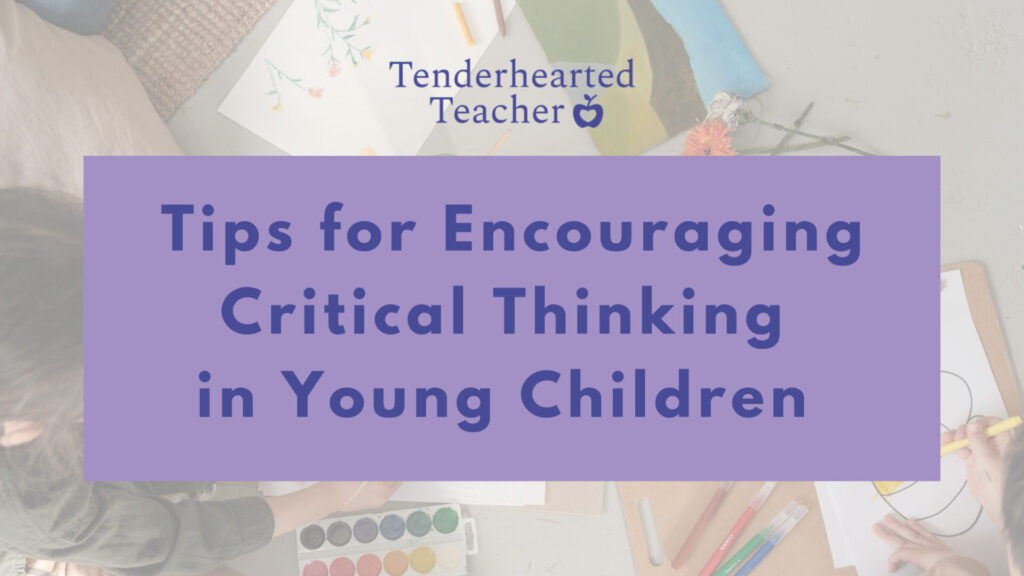
I recently chatted with Nikki from the “What I Wish My Mother Taught Me,” podcast. We talked about critical thinking skills, why they are important in early childhood, and how parents can encourage these skills in their young children. I’ve summarized our discussion here so you can learn more about this crucial topic.
First, What Are Critical Thinking Skills?
“Simply put, students who are able to think critically are able to solve problems effectively. Merely having knowledge or information is not enough. To be effective in the workplace (and in their personal lives), students must be able to solve problems to make effective decisions; they must be able to think critically.”
Lisa Gueldenzoph Snyder & Mark J. Snyder
My basic definition of critical thinking involves a set of higher-level skills that allow us to take in new information, carefully process and analyze it, and use it to form ideas and opinions. These skills are essential to everyday life. They help us –adults and children alike– make informed decisions, problem-solve, plan and set goals, and even communicate and collaborate with others.
I truly believe early childhood is a great time to start encouraging these important skills in our little ones. We can start to lay the groundwork early; this way they have time to practice and refine these skills as they mature and develop. It’s important to do this because they will continue to use these critical thinking skills in and out of the classroom, in their relationships, and eventually in their careers.
How Can Adults Encourage Critical Thinking Skills in Children?
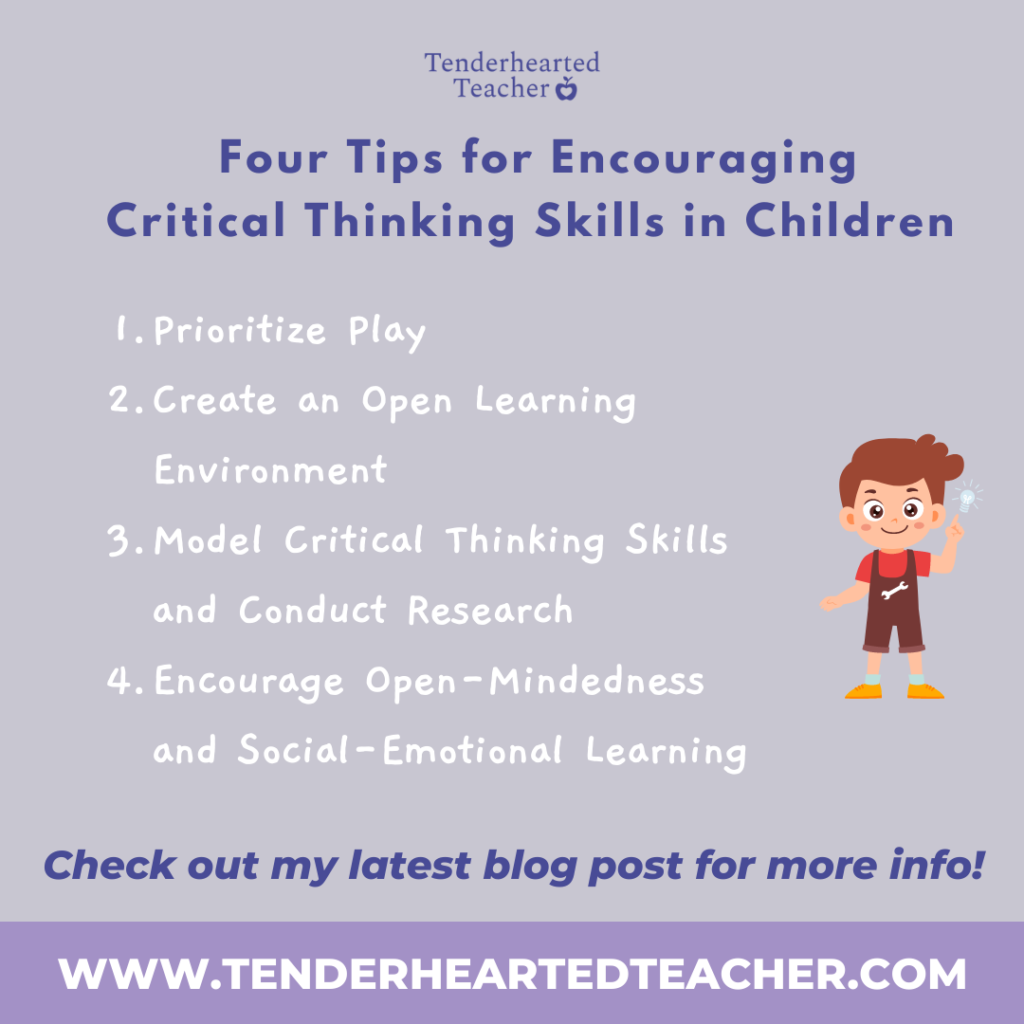
Here are some of my recommendations for fostering these skills in young children:
1. Prioritize Play
Oftentimes people look at play as if it’s just fun and games, but it is actually fundamental to a child’s overall development. It’s how children learn about the world around them as well as how to interact with the people around them. Through play, children not only develop cognitive, academic, and motor skills but also social-emotional ones. Ideally, children should be given the opportunity to explore myriad materials and scenarios. This means that parents should allow them to play in different settings (indoors/outdoors,) with a variety of toys and objects, and give them chances to play independently too. Open-ended toys are ideal because the play opportunities are endless and there isn’t one set or right way of playing with them. This allows for greater creativity and more meaningful learning experiences.
2. Create an Open Learning Environment
Parents should create a home that welcomes questions, brainstorming, investigations, and even failure. Adults should provide opportunities to problem-solve and experiment. STEM activities are great practice for this. When kids are involved in explorations, ask them open-ended questions, help them come up with predictions and hypotheses, and don’t intervene immediately. Let them try their own strategies first. Their solutions might not look like yours and that’s okay.
Here are a few of my favorite activities and/or games for preschoolers that encourage critical thinking skills:
- Read a variety of books with diverse themes and characters. While reading books, ask story-related questions, “Who, What, When, Where? Why?” Additionally, ask them to make predictions, at the beginning of the story, about what they think will happen. Then, ask them to make inferences. In other words, see if their predictions have changed after learning new information.
- Play guessing games like “I Spy” or “What’s in the box?” where you provide abstract clues to help them find an answer.
- Set up STEM activities where they have to find the solution to a problem. For example, building bridges, structures, or vehicles with loose parts of recyclable materials.
- Play games to determine the similarities or differences between objects.
3. Model Critical Thinking Skills and Conduct Research
Another aspect of critical thinking is researching information. We live in the time of the internet—where so much information is at our fingertips, but this also leaves us susceptible to misinformation. Critical thinking skills are necessary for determining what’s factual and what’s not. So, if your child asks you a question and you’re unsure of the answer, let them look up the answer with you. Look in reputable sources like encyclopedias, scientific journals/publications, etc. Or ask an expert, like a librarian, to help you locate appropriate sources. Let them know that not everything you see or read online is accurate. So, it may be necessary to look for multiple reputable sources. This will help them down the road when it comes time to do this on their own.
4. Encourage Open-Mindedness And Social-Emotional Learning
Finally, open-mindedness and social-emotional learning are key components to critical thinking. Young children can learn to be open-minded through exposure and by example–meaning the adults in their life should model this behavior themselves. Additionally, adults should expose their children to different cultures, backgrounds, and experiences. This can be with food, books, television, music, visiting museums, etc. All of these strategies help to develop empathy as well. Role-playing activities can help them develop more of an awareness of what others may feel, think, or experience. Finally, these strategies allow children to be creative and independent thinkers, learn to communicate more effectively, understand the opinions and experiences of others, be open to multiple solutions, and not fear failure.
What Parents/Caregivers Should Avoid
There are a few things parents/caregivers do, often unintentionally, that can stifle the development of critical thinking skills.
- This might be a bit controversial for some old-school parents, but expecting blind obedience from your child isn’t always a good thing. In fact, it can leave them more susceptible to predatory behavior and peer pressure. Sure, there are some people out there who may believe that children should be “seen and not heard” and that they should follow the orders of their parents and authority figures without question. However, it can lead to children blindly following the ideas and suggestions of potential negative influences too– without considering the consequences. To combat this, parents should again create a welcoming environment that allows for respectful questioning, discussions, and collaboration.
- The second issue is not providing children with opportunities to try (and fail) things on their own. Parents should avoid constant interference as well as trying to fix all of their child’s problems. Sometimes the best way for a child to learn a new skill is to try, try, and try again.
Conclusion
So much of what we already do as parents and educators can help our children to develop crucial life skills i.e. academic, motor, social-emotional, etc. The same goes for critical thinking skills. By encouraging curiosity and exploration, open-ended discussions, and providing opportunities to problem-solve, our children can pick up important critical thinking skills that can set them up for success in school and in life.
Now talk to me! What do you do at home to encourage critical thinking skills? Leave a comment below.
‘This post was featured by Twinkl in their Exams and Revision Blog‘
Reference: Gueldenzoph Snyder , L., & Synder , M. J. (2008). Teaching critical thinking and problem solving skills. The Delta Pi Epsilon Journal, L(No. 2), 90–99.
SAVE TO PINTEREST
